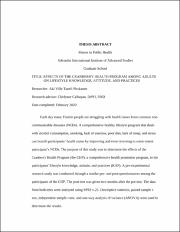Effects of the Cranberry health program among adults on lifestyle knowledge, attitude, and practices
Abstract
Each day many Finnish people are struggling with health issues from common noncommunicable
diseases (NCDs). A comprehensive healthy lifestyle program that deals
with alcohol consumption, smoking, lack of exercise, poor diet, lack of sleep, and stress
can benefit participants’ health status by improving and even reversing to some extent
participant’s NCDs. The purpose of this study was to determine the effects of the
Cranberry Health Program (the CHP), a comprehensive health promotion program, to the
participants' lifestyle knowledge, attitude, and practices (KAP). A pre-experimental
research study was conducted through a similar pre- and post-questionnaires among the
participants of the CHP. The post-test was given two months after the pre-test. The data
from both tests were analyzed using SPSS v.25. Descriptive statistics, paired sample ttest,
independent sample t-test, and one-way analysis of variance (ANOVA) were used to
determine the results.
The results showed that a mean KAP level among the post-test group was high in knowledge (M = 12.03, SD = 3.99) t(39) = -8.55, p = .000 when compared to the pre-test group (M = 7.75, SD = 2.92). A mean KAP level among the post-test group was also high in practices (M = 12.96, SD = 4.57) t(39) = -8.06, p = .000 when compared to the pre-test group (M = 7.3, SD = 3.55). However, those who participated in the post-test had a lower mean KAP (M = 3.72, SD = 0.67) t(39) = 0.93, p = 0.36 in their attitude when compared to the pre-test (M = 3.78, SD = 0.67). Therefore, the results indicated, when compared between the pre-test and the post-test groups, that the CHP was an effective program for increasing the level of lifestyle knowledge (p = .000) and lifestyle practice (p = .000) but not lifestyle attitude (p = 0.36) in the two-month program. There was no significant difference in a mean KAP after the CHP intervention when taking into consideration the moderating effect of gender, age, marital status, educational level, occupation, and presence of lifestyle disease. This study concluded that the CHP was an effective program for changing people's lives in terms of lifestyle knowledge and practices.


